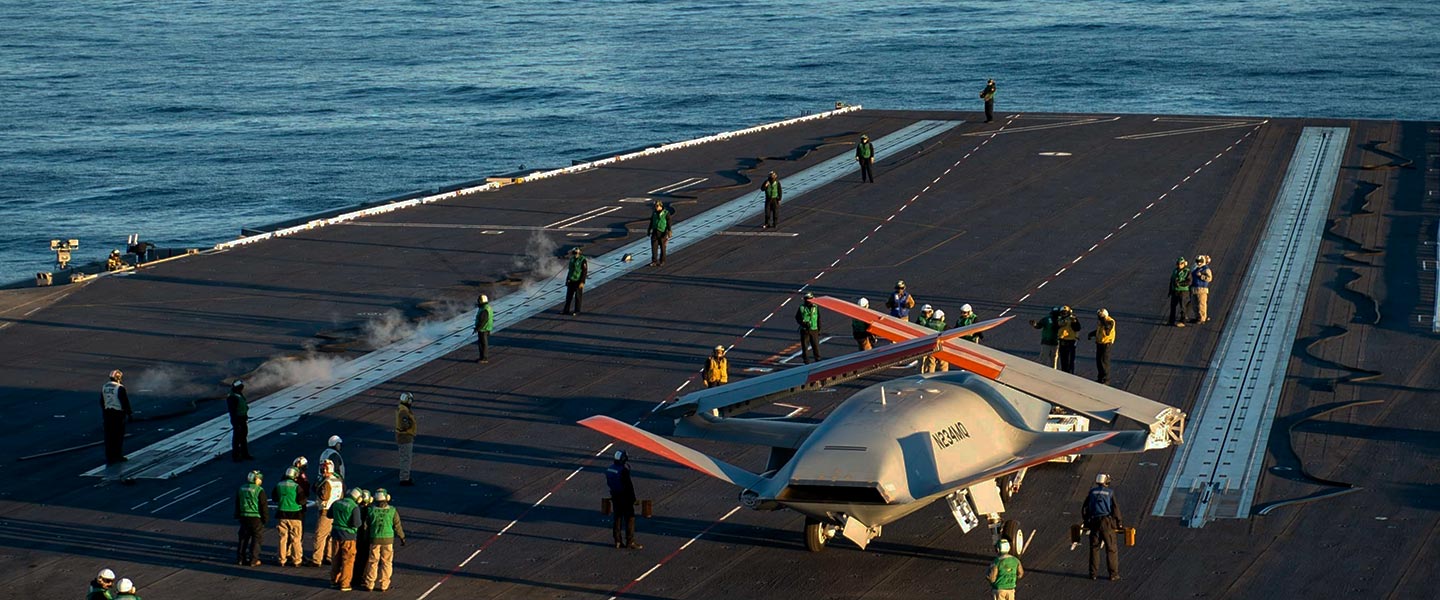Air Vehicle Pilot

Air Vehicle Pilots are the Navy’s Drone Pilot Officers, leading the charge in unmanned aviation. From the deck of a carrier, you’ll operate the MQ-25 Stingray, the first unmanned aerial refueling platform in naval history. With advanced training and unmatched precision, you’ll extend missions, refuel aircraft mid-flight and set the standard for unmanned arial vehicle operations across the fleet. Ready to take command of the Navy’s newest frontier?
More information
Responsibilities
Drone Pilot Officers operate the Navy’s most advanced unmanned aircraft from the carrier flight deck, such as the MQ-25 Stingray. Their responsibilities include:
- Piloting the MQ‑25 Stingray to conduct in-flight refueling, extending the reach and endurance of the F/A‑18 Super Hornet, EA‑18G Growler, and F‑35C aircraft.
- Developing, refining and implementing tactics, techniques and procedures for unmanned aerial vehicle operations.
- Serving ashore as instructors and mentors to train the next generation of Sailors in drone pilot jobs.
- Supporting future unmanned aircraft platforms, such as the MQ-4C Triton.
WORK ENVIRONMENT
As a Navy Drone Pilot, the world is both your classroom and your mission. You may deploy aboard aircraft carriers, directing unmanned flight operations that extend the reach of the carrier strike group. Ashore, you’ll serve in training commands, UAV development units and operational planning staffs, shaping the next generation of unmanned aviation. Assignments may be stateside or overseas, with the potential for worldwide deployment, putting you at the forefront of naval aviation in a variety of operational and technical environments.
TRAINING & ADVANCEMENT
Those pursuing a career as a Drone Pilot must first attend Officer Candidate School (OCS) in Newport, RI. This 13-week program provides a comprehensive introduction to Navy leadership, traditions, military structure, and professional development, preparing candidates for appointment as Warrant Officers.
Following OCS, candidates enter a specialized training pipeline of approximately 15–18 months, beginning at the Naval Aviation Schools Command, Naval Airstation School (NAS) Pensacola, FL. Flight training mirrors that of Naval Aviators and Naval Flight Officers, focusing on safety-of-flight, technical proficiency and in-flight refueling operations with unmanned aircraft.
Drone Pilots hold ranks from W‑1 through W‑5, with opportunities to advance into senior technical leadership roles. Advanced training and operational experience throughout their careers prepare them for leadership within Navy aviation and for highly specialized roles in the civilian sector, including UAV operations, aviation management, defense contracting and related technical fields.
EDUCATION OPPORTUNITIES
The Navy provides Drone Pilots with opportunities for advanced training and professional development throughout their careers. This includes instruction in unmanned systems, aviation safety and leadership, ensuring you stay at the forefront of naval aviation technology. In addition, you may have the chance to earn specialized qualifications on platforms like the MQ‑4C Triton during future assignments. These programs support both career advancement within the Navy and the development of highly sought-after skills for civilian aviation and technical careers.
Wherever you are in your professional career, the Navy can help ease your financial burdens and advance your career with generous financial assistance and continuing education programs. Opportunities for further education within this platform include:
QUALIFICATIONS & REQUIREMENTS
To become a Drone Pilot, candidates must be U.S. citizens and meet Navy physical and medical standards for aviation duty. You must be eligible for a secret security clearance, with some assignments potentially requiring higher-level clearance. Completion of Officer Candidate School (OCS) is required prior to appointment as a Warrant Officer‑1.
Educational requirements include an associate’s degree, with a bachelor’s degree preferred. Civilian applicants should contact a Navy Officer Recruiter for guidance, while enlisted personnel may apply through their Command Career Counselor. Qualifications may vary depending on prior service, education and experience.
PART-TIME OPPORTUNITIES
There are no part-time jobs as a Navy Reserve Sailor in this role. Go back to Careers to find other jobs that have a Reserve component. You can also find out more about what life is like as a Reserve Sailor in the Navy.































































































































